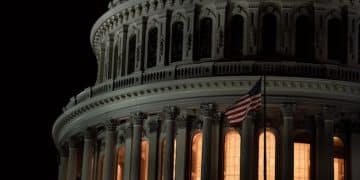Dark Money in Politics: Can New Regulations Bring Transparency?

Dark money in politics refers to funds spent to influence elections where the donors are not disclosed, and new regulations aim to increase transparency and accountability in campaign finance.
The influence of dark money in politics has become a significant concern in the United States, raising questions about the integrity and transparency of elections. As undisclosed funds flow into campaigns, the need for effective regulations to illuminate hidden campaign contributions becomes increasingly urgent.
Understanding Dark Money in Politics
Dark money in politics refers to funds used to influence elections where the donors are not disclosed. This lack of transparency can obscure the true sources of financial support for candidates and political causes, potentially leading to undue influence and a distorted political landscape.
The rise of dark money has amplified concerns about fairness and accountability in the electoral process. Understanding its mechanisms and impacts is crucial for informed civic engagement and the development of effective regulatory solutions.
Sources of Dark Money
Dark money originates from various sources, including:
- Nonprofit Organizations: Many 501(c)(4) social welfare organizations can engage in political activities without disclosing their donors. This allows wealthy individuals and corporations to contribute large sums anonymously.
- Limited Liability Companies (LLCs): LLCs can be used to shield the identities of individuals or entities contributing to political campaigns. The true source of the funds remains hidden behind the corporate veil.
- Super PACs: While Super PACs must disclose their donors, they can receive funds from dark money groups, creating a layer of separation between the original donor and the political activity.
These sources exploit loopholes in campaign finance laws to keep the public in the dark about who is funding political campaigns, making it difficult to trace the influence of money in elections.

Impact on Elections
The influx of dark money can significantly impact elections by:
- Distorting Public Discourse: Anonymously funded ads and campaigns can spread misinformation and propaganda without accountability, misleading voters and undermining public trust.
- Influencing Policy Decisions: Elected officials who benefit from dark money may be more likely to favor the interests of their undisclosed donors, potentially leading to policies that do not serve the public good.
- Creating an Uneven Playing Field: Candidates who have access to dark money can outspend their opponents, giving them an unfair advantage in elections and limiting the ability of ordinary citizens to compete.
The consequences of dark money extend beyond individual elections, impacting the overall health and integrity of democratic institutions.
In conclusion, understanding dark money involves recognizing its multifaceted origins and the profound ways it can sway electoral outcomes, underscoring the necessity for regulatory reforms to foster transparency and fairness.
The Current Regulatory Landscape
The current regulatory landscape governing campaign finance in the United States is a complex web of laws and regulations at both the federal and state levels. These aim to ensure transparency and prevent corruption, but also contain loopholes that allow dark money to flourish.
Existing laws require disclosure of donors to political campaigns and committees, but these regulations often fail to capture the true sources of funding due to legal loopholes and evolving campaign finance practices.
Federal Election Commission (FEC)
The FEC is the primary federal agency responsible for enforcing campaign finance laws. However, its effectiveness has been hampered by:
- Partisan Gridlock: The FEC is often deadlocked along party lines, making it difficult to investigate and prosecute violations of campaign finance law.
- Limited Resources: The agency lacks the resources necessary to effectively monitor and enforce campaign finance regulations, particularly in the face of increasingly complex funding schemes.
- Judicial Challenges: FEC regulations have been frequently challenged in court, leading to legal uncertainties and limitations on its authority.
These challenges have weakened the FEC’s ability to regulate dark money and hold those who violate campaign finance laws accountable.
Citizens United Decision
The Supreme Court’s 2010 Citizens United decision further complicated the regulatory landscape by:
- Removing Restrictions on Corporate and Union Spending: The decision held that corporations and unions have the same First Amendment rights as individuals, allowing them to spend unlimited amounts of money on political advertising.
- Creating Super PACs: Citizens United paved the way for the creation of Super PACs, which can raise and spend unlimited amounts of money to support or oppose candidates but cannot directly coordinate with campaigns.
This decision significantly increased the amount of money in politics and made it easier for dark money groups to influence elections without disclosing their donors.

State-Level Efforts
In response to the limitations of federal regulation, some states have taken steps to address dark money by:
- Requiring Disclosure of Donors to Political Advertisements: Some states mandate that organizations that fund political advertisements disclose their donors, regardless of their tax status.
- Establishing Independent Ethics Commissions: These commissions are tasked with investigating and enforcing campaign finance laws, often with greater independence and resources than the FEC.
- Implementing Campaign Finance Reforms: Some states have enacted reforms to limit campaign contributions, strengthen disclosure requirements, and promote transparency in elections.
These state-level efforts represent an important step toward addressing dark money, but their effectiveness is limited by the lack of a comprehensive federal approach.
In conclusion, the current regulatory landscape is challenged by legislative loopholes, partisan deadlock, and judicial decisions, which collectively enable dark money to persist. However, state-level initiatives offer some promise for increased transparency and accountability.
Proposed Regulations to Shine a Light
In response to the pervasive influence of dark money in politics, various regulatory reforms have been proposed at both the federal and state levels. These proposals aim to enhance transparency, strengthen enforcement, and limit the impact of undisclosed funds on elections.
The effectiveness of these proposed regulations hinges on their ability to close existing loopholes, withstand legal challenges, and garner bipartisan support.
DISCLOSE Act
The DISCLOSE Act is a federal bill that would require:
- Disclosure of Donors to Political Advertisements: The bill would mandate that any organization spending money on political advertisements disclose its donors, regardless of its tax status.
- Enhanced Reporting Requirements: The DISCLOSE Act would strengthen reporting requirements for Super PACs and other political committees, making it easier to trace the flow of money in elections.
- Online Ad Disclosure: The bill would require online platforms to disclose the sources of funding for political advertisements, bringing online advertising under the same regulatory framework as traditional media.
The DISCLOSE Act aims to close loopholes that allow dark money groups to hide their donors and ensure that voters know who is funding political campaigns.
Empowering the FEC
Strengthening the FEC’s enforcement capabilities could involve:
- Restructuring the Commission: Reforming the FEC to reduce partisan gridlock and ensure that enforcement decisions are based on objective criteria.
- Increasing Funding: Providing the agency with additional resources to investigate and prosecute violations of campaign finance law, including dark money schemes.
- Clarifying Regulatory Authority: Clarifying the FEC’s authority to regulate new forms of political spending, such as online advertising and issue advocacy.
Empowering the FEC could enhance its ability to regulate dark money and hold those who violate campaign finance laws accountable.
Constitutional Amendments
Some reformers have proposed constitutional amendments to:
- Overturn Citizens United: An amendment could clarify that corporations are not persons with the same constitutional rights as individuals, allowing Congress to regulate corporate spending in elections.
- Limit the Influence of Money in Politics: An amendment could establish that money is not speech and that Congress can regulate campaign finance to prevent corruption and promote equality.
These amendments would represent a fundamental shift in campaign finance law and could significantly reduce the influence of dark money in politics.
In conclusion, proposed regulations such as the DISCLOSE Act, empowering the FEC, and constitutional amendments aim to address the challenges posed by dark money, offering potential pathways to greater transparency and accountability in campaign finance.
Challenges and Obstacles to Reform
Despite growing calls for regulatory reforms to address dark money in politics, significant challenges and obstacles stand in the way. These include legal challenges, political opposition, and the ingenuity of those seeking to circumvent campaign finance laws.
Overcoming these challenges will require a sustained commitment to reform and a willingness to address the underlying issues that allow dark money to thrive.
First Amendment Concerns
Opponents of campaign finance regulation often argue that:
- Disclosure Requirements Infringe on Free Speech: Mandating disclosure of donors could deter individuals and organizations from contributing to political campaigns, infringing on their First Amendment rights.
- Spending Limits Restrict Political Expression: Limiting the amount of money that can be spent on political advertising could stifle political expression and prevent candidates from effectively communicating with voters.
These arguments have been used to challenge campaign finance regulations in court and could pose a barrier to future reforms.
Partisan Polarization
Campaign finance reform has become increasingly politicized, with:
- Democrats Supporting Greater Regulation: Democrats generally favor stricter campaign finance laws and greater disclosure of donors.
- Republicans Opposing Regulation: Republicans tend to oppose campaign finance regulations, arguing that they infringe on free speech and create an uneven playing field for candidates.
This partisan divide has made it difficult to pass meaningful campaign finance reforms at the federal level.
Evolving Tactics
As regulators attempt to close loopholes and strengthen campaign finance laws, those seeking to influence elections are constantly developing new tactics to circumvent these regulations, such as:
- Using Social Welfare Organizations: Donating to 501(c)(4) organizations that engage in political activity without disclosing their donors.
- Creating Shell Corporations: Funneling money through LLCs and other shell corporations to hide the true source of funding.
This cat-and-mouse game makes it difficult to effectively regulate dark money and requires constant vigilance and adaptation on the part of regulators.
In conclusion, reforming campaign finance faces significant obstacles, including legal challenges基于第一修正案的担忧, partisan divisions, and the ongoing evolution of financial tactics, which collectively complicate efforts to regulate dark money effectively.
The Role of Technology and Social Media
Technology and social media have transformed the landscape of political campaigning, providing new avenues for candidates and organizations to reach voters. However, they have also created new challenges for regulating dark money and ensuring transparency in elections.
The anonymity and reach of online platforms make it easier for dark money groups to spread misinformation and influence voters without being held accountable.
Online Advertising
Online advertising has become a major source of political spending, but:
- Regulations Lag Behind Technology: Existing campaign finance laws were not designed to address online advertising, leaving it largely unregulated.
- Platforms Lack Transparency: Social media platforms and other online advertising networks often lack transparency about the sources of funding for political advertisements.
This makes it difficult to track the flow of dark money online and hold those who spread misinformation accountable.
Microtargeting
Microtargeting allows political campaigns to:
- Target Specific Demographics: Campaigns can target voters based on their age, gender, location, interests, and other characteristics.
- Deliver Personalized Messages: Campaigns can tailor their messages to appeal to specific voters, increasing their effectiveness.
However, microtargeting can also be used to spread misinformation and propaganda to targeted groups of voters, without the scrutiny of the broader public.
Foreign Interference
Technology and social media have also made it easier for foreign actors to:
- Interfere in US Elections: Foreign governments and organizations can use online advertising and social media to spread propaganda and influence voters.
- Disguise the Source of Funding: Foreign actors can use dark money groups to hide their involvement in US elections.
This poses a significant threat to the integrity of US elections and underscores the need for stronger regulations and enforcement.
In conclusion, technology and social media present unique challenges for regulating dark money, including online advertising, microtargeting, and foreign interference, highlighting the need for adaptive regulatory frameworks to maintain election integrity.
The Potential Impact of New Regulations
The implementation of new regulations aimed at shining a light on dark money in politics could have far-reaching impacts on the electoral process. These potential impacts include increased transparency, greater accountability, and a more level playing field for candidates.
However, the effectiveness of these regulations will depend on their ability to withstand legal challenges and their enforcement by regulatory agencies.
Increased Transparency
Effective regulations could lead to:
- Disclosure of Donors: Requiring organizations that spend money on political advertisements to disclose their donors would provide voters with more information about who is funding political campaigns.
- Greater Accountability: Increased transparency would make it more difficult for dark money groups to operate in the shadows, holding them accountable for their actions.
This could lead to a more informed electorate and a more responsible political discourse.
Level Playing Field
New regulations could help create:
- More Competitive Elections: Limiting the influence of dark money could make elections more competitive, giving ordinary citizens a better chance to compete.
- Reduced Influence of Special Interests: Reducing the influence of undisclosed donors could lead to policies that better serve the public good, rather than the interests of special interests.
This could lead to a more representative democracy and a more responsive government.
Restoration of Public Trust
Addressing dark money could help:
- Rebuild Confidence in Elections: Increasing transparency and accountability could restore public trust in the electoral process.
- Strengthen Democratic Institutions: Strengthening campaign finance laws could help protect democratic institutions from corruption and undue influence.
This could lead to a more engaged and participatory citizenry.
| Key Point | Brief Description |
|---|---|
| 💰 Dark Money Defined | Undisclosed funds influencing elections, obscuring donor identities. |
| ⚖️ Regulatory Challenges | Partisan gridlock and legal loopholes hinder effective enforcement. |
| 💡 Proposed Solutions | DISCLOSE Act and FEC empowerment aim for transparency. |
| 🌐 Tech & Social Media | Platforms pose challenges due to online ads and microtargeting. |
Frequently Asked Questions
Are contributions to these groups tax-deductible?
▼
No, contributions to 501(c)(4) social welfare organizations are generally not tax-deductible for the donor.
What is the Citizens United ruling’s impact?
▼
It allowed unlimited spending by corporations and unions on political ads, leading to Super PACs.
How does anonymous funding affect voters?
▼
It hides who supports candidates, impacting voters’ decisions due to lack of transparency.
What is the DISCLOSE Act’s goal?
▼





